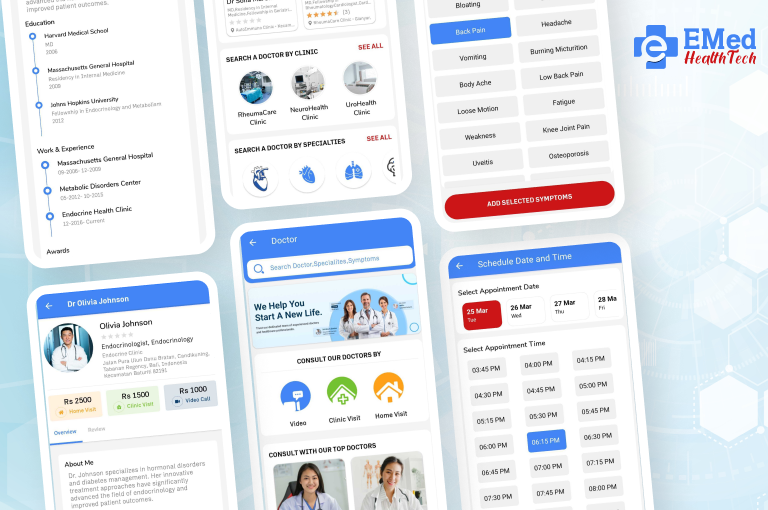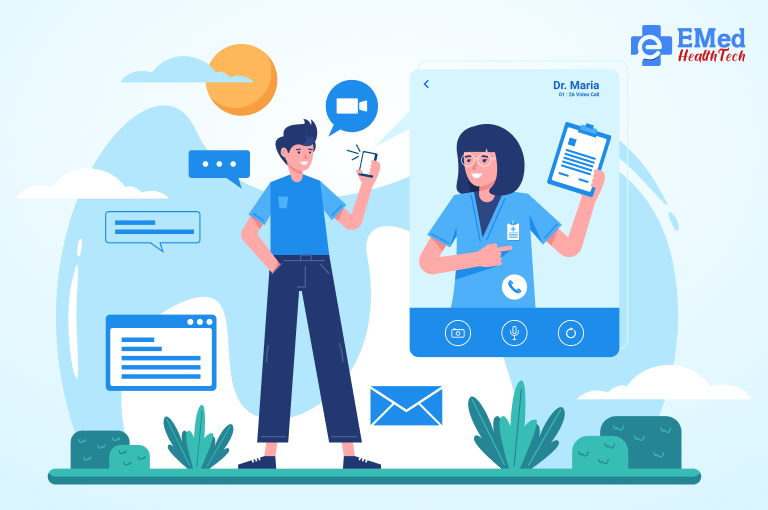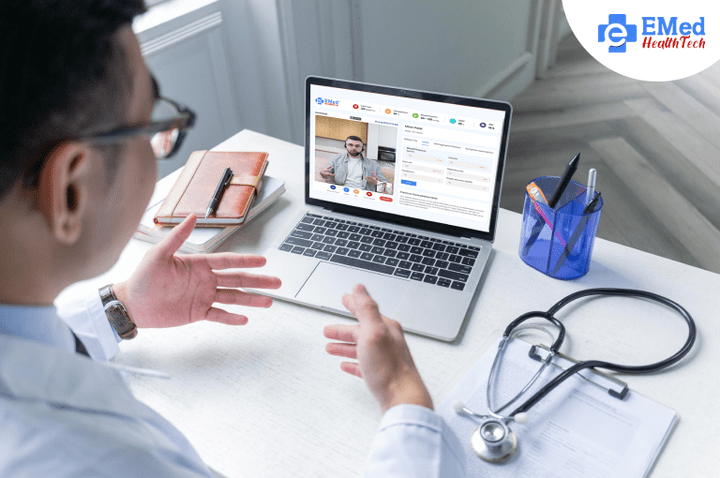Ami Kothari
Telemedicine is a blessing for the modern world. It opens up opportunities that we did not have. With it, patients have remote access to healthcare services. They can have remote doctor visits and get diagnoses and treatment plans.
Telemedicine is famous for patients since the pandemic. It was popular in the US too. With this technology, patients could stay in the safety of their homes and get healthcare services.
Its traction will increase in the coming years as well. Healthcare providers need to prepare for the future. They should understand everything that goes into making such an app.
Our experts have listed the key points for developing a customized Telemedicine app. Save this list to make sure your app stands out from your competitors.
1. Keeping the Telemedicine App User-Friendly
User interface design is what a patient sees when using your app. This interface must be simple, intuitive, and user-friendly. Only then can a patient find what they are looking for. Navigation is important for retention as well.
It should have an optimized interface design for different devices. This way patients can use the app from smartphones, tablets, and desktops. A well-designed app encourages patients to use the app. The result is better patient engagement and improved health outcomes.
2. Ensuring the Essential Feature Set of Telemedicine
Creating a custom telemedicine app requires choosing its features. The must-haves are video calls and messaging. Other facilities include appointment booking, and managing patient records. There should be the option to customize features for different medical fields. Customization lets healthcare providers adapt the app to their specialty.
3. Hiring Experienced Telemedicine App Developers
Building a top-notch telemedicine app does not happen overnight. It is the hard work of experts. You must hire experienced telemedicine app developers. They know the ins and outs of app development. Their experience can make sure it’s trustworthy, safe, and easy to use.
A good app should be able to integrate with other healthcare systems. Always choose a team with a good history in custom telemedicine app development. This can save you time and money.
4. Managing Costs and Timeline for Development
Developing a telemedicine app involves significant costs. Without careful thought, it can end up in losses. Careful management of the budget and timeline is essential. The budget should include development expenses, platform fees, framework costs, and ongoing maintenance.
A budget allows healthcare providers to understand the financial implications and plan accordingly. Setting up a clear development timeline helps ensure the project stays on track and within budget. Consider all the costs before you get down to developing. This way you can ensure your investment pays off.
5. Seamless Integration with Third-Party Systems
For custom telemedicine apps, connecting with other systems is vital. Developers do this by integrating APIs. It can communicate and coordinate with other essential services. eg: With API integrations, you get all that you need in one interface. Some of the common integrations are:
- Electronic Health Records (EHRs)
- Payment Gateways
- Communication Systems
- Patient Data Recording
The developer you choose has to be an expert in API integration. This will give you peace of mind regarding privacy and security. A smooth API integration means that your app works smoothly.
6. Prioritizing Data Security and Privacy
A customized telemedicine app deals with a lot of information. This is sensitive information. Handling and storing them come under legal scrutiny. In the US there are regulations like the HIPAA. It ensures that patient data are private and safe.
The app has to comply with the regulations of the region. This will help prevent unauthorized access or leak of data. The app should be well protected with necessary security measures. Some of them are
- end-to-end encryption
- regular security audits
- secure user authentication
7. Healthcare Regulatory and Security Compliance
As discussed above, regulatory bodies have strict rules to bind medical practices. Here are some aspects, eg: Medical malpractice, privacy, billing and coding, and prescription drug regulation.
These strict measures promote transparency and accountability. HIPAA is one such regulation enforced in the United States. Other countries have different compliance such as PDP, PIPEDA, GDPR, and HL7/FHIR. Here is the healthcare regulatory compliance to follow while developing an application. All of these are in place to promote ethics in the industry.
8. Custom Telemedicine App Development for Specialty Care
Every area of medical/healthcare is different. The kind of healthcare app development services provided varies from one to the other. The apps that cater to this department are bound to be different. Telemedicine app development services should be flexible. They should be able to create custom apps for these different departments.
A telemedicine app development company is building an app for mental health, neurology, and more. The interface for each of these areas would be different. The mental health app would have mood trackers, virtual therapy sessions, etc. The pediatrics app would have vaccination schedules and growth trackers.
9. Uninterrupted Care Delivery with Telemedicine
Uninterrupted care is vital for app users. Having 24/7 customer support is a must for healthcare providers and patients. If there’s a technical problem or any issue, support is required. Choose the telemedicine app development company that provides 24/7 SLA support.
With round-the-clock support, they can give support at all times. This ensures continuous care. This reduces the chances of treatment interruptions and keeps patients happy. Efficient support lets healthcare providers catch and fix problems early. This way you can prevent bigger issues down the road.
10. Enhancing User Experience with Additional Features
Including the main features, custom Telemedicine apps can have extra features like push notifications and chatbots. They give users quick and easy access to information. Automated appointment reminders decrease no-shows and keep patients engaged. They may be designed to make the user experience better. These are what sets an ordinary app from a good one. Multi-language support feature helps reach a diverse patient group.
Having these features makes the app more appealing to both parties. It’s a great way to improve the experience and satisfaction of users.
Summing Up
The concept of Telemedicine is growing. It is making healthcare easy to access and affordable. But it takes a lot of work and effort to make it happen. It takes the well-thought-out planning of a provider and the skill of a developer. If skill, planning, and implementation come in the right proportion, it makes a great app.
Are you looking for custom telemedicine app development services? EMed HealthTech will be the best choice. Make sure you keep all of the above tips in mind.
By prioritizing these factors, healthcare providers can create great apps. These apps can deliver patients safe, effective, and personalized care.
At EMed HealthTech, we understand the challenges in delivering virtual services. And we explained, how to get the benefits of Telemedicine in Virtual care. That’s why we offer custom telemedicine app development services that cater to different needs.
We have a team of expert developers having vast experience in developing telemedicine apps for a long list of clients. We ensure compliance, ease of use and provide 24/7 SLA support.
Contact us today to learn more about customized Telemedicine application development by EMed HealthTech. We can help you deliver the best care possible to your patients.
Related posts

Telemedicine
How to Choose the Best Telemedicine App Development Company in the U.S.
Introduction The demand for telemedicine apps in the U.S. is at an all-time high, with healthcare providers rapidly adopting digital solutions to offer remote consultations and improve patient care. Choosing the right telemedicine app development company in the U.S. is crucial for ensuring seamless functionality, compliance with healthcare regulations, and a superior user experience. In […]
Read more
Telemedicine
Telemedicine in 2025: Top Mobile App Development Trends Shaping the Future of Healthcare
As we move into 2025, telemedicine is emerging as a key player in healthcare innovation. The rapid evolution of telemedicine app development redefines patient care and makes healthcare more accessible, flexible, and efficient.
Read more
Telemedicine
The Future of Telemedicine Platform: Trends to Watch in 2025
Telemedicine has rapidly become one of the most revolutionary aspects of modern healthcare. With its role in medical services expanding each year, the future of telemedicine is filled with incredible potential.
Read more







